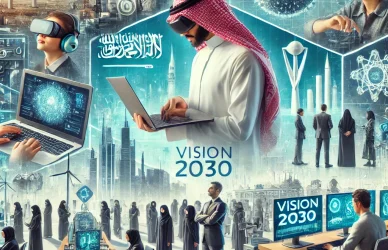Artificial Intelligence (AI) is rapidly transforming industries around the world, and Saudi Arabia is no exception. As the Kingdom continues to diversify its economy and work towards achieving its Vision 2030 goals, AI is playing an increasingly important role in shaping the future of work. In this blog, we explore how AI will change the landscape of jobs in Saudi Arabia and what job seekers and employers need to know to stay ahead of the curve.
1. AI’s Impact on the Saudi Workforce
Artificial Intelligence is expected to have a profound impact on the workforce in Saudi Arabia. From automating routine tasks to creating new types of jobs, AI is reshaping the way businesses operate and the types of skills in demand.
- Automation of Repetitive Tasks: One of the most significant impacts of AI is the automation of repetitive and mundane tasks. Industries such as manufacturing, retail, and logistics will see robots and AI-driven software taking over many manual labor positions, allowing workers to focus on more complex and creative tasks.
- Data-Driven Decision Making: AI’s ability to analyze vast amounts of data and provide actionable insights is transforming decision-making processes. In sectors like finance, healthcare, and marketing, AI is being used to optimize operations, enhance customer experiences, and make more informed business decisions.
- New Jobs and Roles: While AI will replace some jobs, it will also create new ones. These new roles will require a combination of technical and soft skills. AI will lead to the emergence of roles such as AI specialists, data scientists, AI ethicists, and cybersecurity professionals.
2. AI and Vision 2030: Transforming the Saudi Economy
Saudi Arabia’s Vision 2030 aims to diversify the economy and reduce dependence on oil, and AI is a key enabler of this transformation. As the Kingdom invests in smart cities, renewable energy, and technological innovation, AI will become a critical tool for achieving these ambitious goals.
- Smart Cities: Projects like NEOM, the futuristic smart city being built in the north of Saudi Arabia, are leveraging AI for urban planning, transportation, and environmental monitoring. AI will be integral to the development of these smart cities, where everything from traffic flow to energy use is managed intelligently.
- Healthcare Advancements: AI is set to revolutionize healthcare in Saudi Arabia. AI-driven diagnostic tools, personalized medicine, and robotic surgery are just a few examples of how AI will improve healthcare outcomes. This shift will create new jobs in AI healthcare applications, including roles for data analysts, robotic surgeons, and medical AI developers.
- Education and Training: As AI becomes more pervasive, Saudi Arabia’s education sector will also evolve. AI-powered learning platforms will provide personalized education, helping students and workers alike acquire the skills needed for the future job market. Education will also focus more on STEM (Science, Technology, Engineering, and Mathematics) subjects, ensuring that the next generation is ready for AI-driven industries.
3. Challenges and Opportunities for the Saudi Workforce
As AI reshapes the job market in Saudi Arabia, there will be both challenges and opportunities. It is essential for the workforce to adapt to these changes, and this will require a commitment to lifelong learning and reskilling.
- Job Displacement: One of the biggest concerns regarding AI is job displacement. Roles that involve routine tasks such as data entry, customer service, and manual labor are more likely to be automated, leading to potential job losses. However, workers in these industries can mitigate the impact of AI by developing new skills that complement AI technologies, such as working alongside robots or managing AI systems.
- Skills Development: To stay competitive in the AI-driven job market, workers must focus on acquiring skills that AI cannot easily replicate. These include soft skills such as creativity, critical thinking, and emotional intelligence, as well as technical skills like programming, data analysis, and machine learning. Training programs and certifications in AI and related fields will play a crucial role in equipping workers with the necessary tools for success.
- Collaboration Between AI and Humans: Instead of viewing AI as a replacement for human workers, it’s essential to see it as a tool that can enhance human capabilities. Many jobs in the future will require humans to work alongside AI systems, using their creativity and problem-solving abilities to complement AI’s efficiency and precision.
4. AI in the Saudi Job Market: What Employers Need to Know
For employers in Saudi Arabia, AI presents both opportunities and challenges. To harness the full potential of AI, businesses must invest in the right technologies and strategies. This includes:
- AI Adoption: Companies across all industries will need to adopt AI tools to stay competitive. From automating administrative tasks to implementing AI in customer service, AI can streamline operations and improve productivity.
- Workforce Transformation: Employers will need to invest in reskilling their existing workforce to handle the integration of AI into their jobs. This could involve providing training in new technologies, encouraging employees to learn about AI, and offering opportunities for career development in AI-related fields.
- Ethical Considerations: As AI becomes more integrated into businesses, employers must also address ethical concerns such as data privacy, bias in AI algorithms, and the potential for job displacement. Ethical AI practices will be critical to building trust and ensuring that AI benefits society as a whole.
5. How Job Seekers Can Prepare for AI-Driven Jobs
For job seekers in Saudi Arabia, preparing for the AI-driven future requires proactive efforts in acquiring new skills and staying informed about the latest technological trends.
- Upskill in AI and Technology: Job seekers should focus on gaining expertise in AI-related fields. This includes learning programming languages like Python, mastering data analysis, and understanding machine learning and artificial intelligence concepts.
- Leverage Professional Services: If you’re unsure about how to tailor your resume for AI-driven industries, consider using professional CV writing services that specialize in tech and AI sectors. These services can help you highlight the skills and experience that employers are looking for in an AI-powered world.
Conclusion
The impact of AI on future jobs in Saudi Arabia is undeniable. While AI may automate some roles, it will also create exciting new opportunities in various industries. By staying adaptable and embracing continuous learning, both employers and job seekers can thrive in this new AI-driven era.
Hashtags:
#ArtificialIntelligence #AIJobsKSA #FutureJobsKSA #AIandJobs #TechnologyInKSA #JobOpportunities #AIandEmployment #FutureOfWork #SaudiVision2030 #AIinSaudiArabia #JobSeekersKSA #ReskillForAI #SaudiArabiaAI




